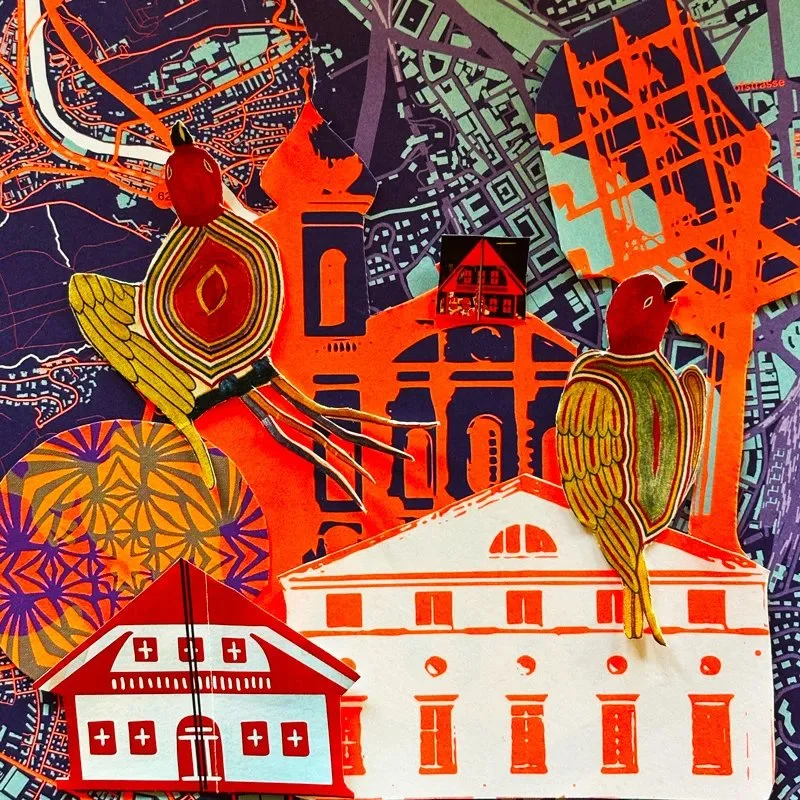Structural Designs
I clipped the maps, buildings, and grids in this colorful paper collage from a community theatre prospectus that I picked up in Lucerne, Switzerland on the way to my annual Mountain Rise writing retreat. (What an amazing week that was!) The two appliquéd birds graced a postcard that I purchased in early June at the Victoria & Albert Museum in London, and I cut out the two Swiss chalets from a tourist brochure advertising tours of a chocolate factory.
Together, these images represent many different kinds of structure: textual, textural, architectural. And what better way to invoke the varied structures of scholarly writing — and to launch my new 6-week focus on Structure — than with a riotous array of straight lines and curved lines, buildings and birds, maps and metaphors?
In early July 2024, in addition to launching ‘Structural Metaphors’ (a 6-week Swordcraft series exploring metaphors for structuring six key aspects of your scholarly writing) and the Structure Sequence of the Live Writing Studio, I also hosted a free 2-hour Special Event all about structure! There I took attendees through a series of strategies for finding the best structure for a current book, thesis, article, chapter, or any other writing project they wanted to focus on. The aim was to create a new structural design by the end of the session.
If you missed this live Special Event, you can register below for the free recording of the live session, or read the highlights below. Enjoy!
Here’s WriteSPACE Event Manager Amy Lewis’ personal account of the live event:
……………
This session was such a treat! Helen coached the attending writers through an interactive structure exercise, with just 30 scraps of paper and 30 minutes. If you’re working on a book or a thesis with many different facets or chapters, this workshop is for you! (Click the green button above to receive the video link). This workshop was great for experimenting with new arrangements, hierarchies, and ways of thinking. Helen also asked us to consider metaphors to invoke new sets of ideas: What would happen if I think about my book or article as a tree? or a city? or a map?
There are, of course, several fantastic tools for a more linear structural organisation (if that floats your boat) — for example, Helen mentioned how to ‘outline’ your structure, revealed tricks for using Scrivener, and recommended Margy Thomas’s ‘fractal structure’, which helps keep sections consistent in length and depth. But it’s worthwhile exploring non-linear tools, too, such as radial mind-mapping using color, metaphor, and sketches. Helen encouraged us to consider how we might approach a linear artefact such as a book using a non-linear structure to give the reader multidimensional ways to read it. (Challenging, but not impossible!) For a great example, take Helen’s book Writing with Pleasure, which was structured like a mosaic mirror—you really don’t need to read this book in a set order. Or Douglas Hofstadter’s book: Gödel, Escher, Bach, which subdivides chapters in a playful way.
It was wonderful to hear the comments from each of the attendees at the live workshop and their takeaways. Helen mentioned that it’s useful to understand the differences between stages of structuring your writing. Ideation (the inception of an idea, the spark that ignites the creative flow), leads to conceptualization (which refines the raw idea into an overall plan), and builds an architecture of ideas (which organises the information). Workshops like this one walk you through these stages, and then you can use metaphor and linear tools to solidify the direction of your project. Interestingly, the more seemingly unstructured or non-linear the topic, the more it lends itself to really strong structural thinking!
A big thank you to Helen for this very helpful Special Event and a warm welcome to all the new writers who joined us. I hope to see you all again at the next Live Writing Studio.
WriteSPACE and WS Studio members can find the recording of the Special Event in their Video library.
Not a member? Register to receive an email with a link to the video of the first hour.
Better yet, join the WriteSPACE with a free 30 day trial, and access our full Library of videos and other writing resources as part of your membership plan.


